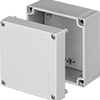Filter by
Material
Environment
Cover Closure Method
Inside Width
Cover Material
Inside Height
Closure Screw Material
Certification
Performance
Export Control Classification Number (ECCN)
DFARS Specialty Metals
Mounting Hole Diameter
External Mount Type
Electrical
Containers, Storage, and Furniture































